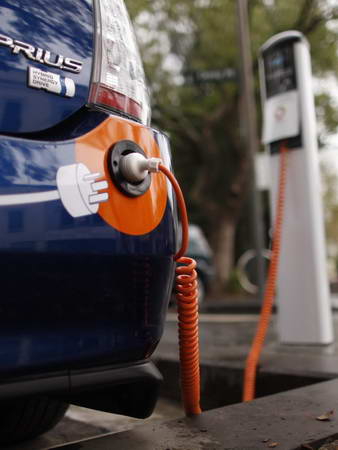Web Exclusive
China reviewing e-car battery standards
By Hao Yan (chinadaily.com.cn)
Updated: 2010-08-25 17:37
 |
Large Medium Small |
China is reviewing three national standards for electric vehicle power batteries, a Chinese researcher said Wednesday at a forum in Beijing.
The three standards submitted concern the electric vehicle conductive charge coupler, communication protocols between battery management system and the off-board charger, and specification and dimension of the traction battery, said Xiao Chengwei, project leader at Tianjin Institute of Power Sources, at the Second Li-ion Battery Forum.
Xiao Chengwei is a member of the expert panel for the 863 (Hi-tech Plan) Alternative Fuel Vehicles Program. The Ministry of Science and Technology guided and supported the program.
"China's EV market is being pushed by the government," said Tobias Giebel, Head of Volkswagen Research Lab China in an interview with chinadaily.com.cn on Wednesday.
Zhenzhen city in southern Guangdong province are using Chinese automaker BYD's EV e6 as taxi from this April.
"Volkswagen recognizes EV and hybrid vehicles as premium programs, not low cost vehicles, especially for downtown usage. They are going to be very powerful, because their engines are improving. The engines could be 2.0 liter engines, performing better than that of the current 1.4 liter ones," said Giebel.
|
||||
Automaker Zotye Auto on July 26 was reported to become the first Chinese company to sell an electric car to an individual buyer. They buyer paid 2,500 yuan a month to lease the car that would sell for more than 200,000 yuan - far more expensive than its 60,000-yuan petrol-powered cousin made by Zotye.
"Hybrid vehicles are more expensive and require more technology, but may save lots of fuel in the near future. Hybrid vehicles could last many years until EV really starts," said Giebel.
"China's EV market may start from the countryside, with off-road electric vehicles. These EV's may have a maximum speed of 40 kilometers per hour, and cost less than 20,000 yuan," said Lu Jiantong, CEO of Lujo EV R&D Co, Ltd.
 |
|
A converted Toyota Prius recharges its battery at Sydney's first public electric car charging station May 25, 2010. [Photo/Agencies] |



